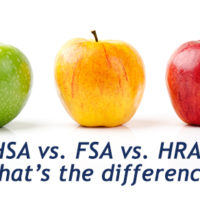Finding the right tax-advantaged account to fund your health care expenses

With health care costs continuing to climb, tax-friendly ways to pay for these expenses are more attractive than ever. Health Savings Accounts (HSAs), Flexible Spending Accounts (FSAs) and Health Reimbursement Accounts (HRAs) all provide opportunities for tax-advantaged funding of health care expenses. But what’s the difference between these three accounts? Here’s an overview:
HSA. If you’re covered by a qualified high-deductible health plan (HDHP), you can contribute pretax income to an employer-sponsored HSA — or make deductible contributions to an HSA you set up yourself — up to $3,350 for self-only coverage and $6,750 for family coverage for 2016. Plus, if you’re age 55 or older, you may contribute an additional $1,000.
You own the account, which can bear interest or be invested, growing tax-deferred similar to an IRA. Withdrawals for qualified medical expenses are tax-free, and you can carry over a balance from year to year.
FSA. Regardless of whether you have an HDHP, you can redirect pretax income to an employer-sponsored FSA up to an employer-determined limit — not to exceed $2,550 in 2016. The plan pays or reimburses you for qualified medical expenses.
What you don’t use by the plan year’s end, you generally lose — though your plan might allow you to roll over up to $500 to the next year. Or it might give you a 2 1/2-month grace period to incur expenses to use up the previous year’s contribution. If you have an HSA, your FSA is limited to funding certain “permitted” expenses.
HRA. An HRA is an employer-sponsored account that reimburses you for medical expenses. Unlike an HSA, no HDHP is required. Unlike an FSA, any unused portion typically can be carried forward to the next year. And there’s no government-set limit on HRA contributions. But only your employer can contribute to an HRA; employees aren’t allowed to contribute.
Questions? We’d be happy to answer them — or discuss other ways to save taxes in relation to your health care expenses.
© 2016
